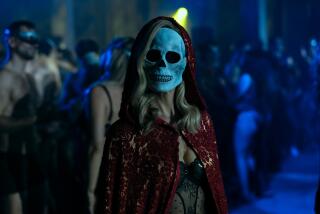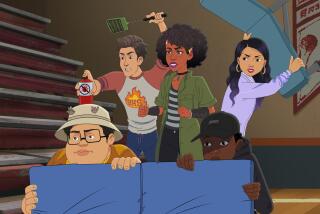Julie Plec takes a break from the supernatural with a virus outbreak in CW’s ‘Containment’
Julie Plec, the queen of CW with series such as “The Vampire Diaries” and “The Originals,” has a whole new kind of villain at the center of a series: a virus.
“Containment,” Plec’s third series with the network, is based on the Belgian series “Cordon.” The CW version of the outbreak-themed drama is set in Atlanta and chronicles an epidemic that has overtaken a city, with its citizens under quarantine.
The 13-episode series, which premiered last week, is being billed as a limited series, but could return if successful. It airs Tuesdays at 9 p.m. ET/PT.
------------
For the record, 6:45 p.m. April 25: An earlier version of this post said that the series would air Mondays. It will air Tuesdays.
------------
Show Tracker spoke to Plec about venturing outside the supernatural to focus on real-life horror and adapting the series for a U.S. audience.
You were obsessed with the Belgian series, right? What had you hooked?
Oh, yeah. It’s wonderful. Ten episodes. And what they did is they shot them all at once like one big, long movie. So they were able to shut down a complete section of the city to do their quarantine scenes and put shipping containers all over the city. It was so amazing what they were able to do. It’s a terrific series. It had all the great things about television that I love. Great inherent suspense and tension. It had really well-realized and fascinating personal and romantic relationships. It had my favorite subject matter: virus, contagion, and fear of the end of the world. And it delivered on everything. The mystery delivered on itself, the relationships delivered, the story had a nice fluidity. It was just a really exceptionally well-executed series.
What are the challenges in not letting your affinity for the series sideline you as you adapt it for the U.S.?
I had to approach it with a very clear point of view of what I was trying to achieve because I had enjoyed the series so much, I wanted to expand on it and I wanted to go deeper in some ways. And obviously the translation of Antwerp to Atlanta was going to involve some shifts, just sociologically speaking. But I knew I didn’t want to do a straight trade. That’s not how I want to write. I don’t want to just take somebody’s material and Americanize it. I wanted to honor the show and celebrate the show as much as I possibly could and take all the great stuff that they had done without just re-creating it word for word. And, so, it was fun. When writers [Matt] Corman and [Chris] Ord sat down in the first week of putting the series together, we laid out the tent poles of what we knew we wanted to accomplish from the Belgian series. We basically filled in all the blanks in between. It was sort of like having a great road map for the series, but still having all the room for discovery.
Is there some freedom in that the show doesn’t really have a following over here and so there is less nitpicking on how close an adaptation it is?
Yeah, I feel like the show didn’t have a global audience. It was very well-received in its own country. And I do know that it aired in the U.K. I’m not sure how big the international audience was. Its not even available in the United States—I searched for it. So, the good news is, the American audience has really no context for it at all. And I think that’s a big decision for a writer. What was that show Fox did?
“Gracepoint”?
Yeah. I had never watched “Broadchurch,” but the one thing I remember reading by the critics is “why did they bother” because I guess they made the series shot-for-shot. I’m sure a lot of people would love that. It’s just not a job I would want to do. The pressure would be terrible. And, also, it limits your creativity.
And this is quite the departure, creatively, for you. Here we have a virus serving as the monster-like figure.
Yeah, that’s how I pitch it when I talk about it. It wasn’t a difficult shift at all because having done so much work over the years dealing with the tension of the monster hiding behind the bed, this was exactly the same kind of show. It’s just that he monster is a virus. I loved it because I didn’t need to come up with any witch spells to either create an obstacle or a solution. The freedom from witchy shenanigans is the greatest, most beautiful, spiritually open and wonderful freedom in the world.
The viewers get a flashback early on. Talk about how long before we catch up to that and how was it like in the writer’s room deciding how you would reach that point?
That’s a good story because in the Belgian version, that story doesn’t exist. And what’s interesting about the way I looked at that experience in watching that series was … Scene 1 was a refugee being snuck into the country and us seeing that they were sick and then the series unfolded from there. But you didn’t see how it was all going to go down. You had no idea. You were watching every step of the way. So the first draft of the pilot that I wrote opened exactly the same way. But what I did was I took the main title sequence from the Belgian show which had shown those really graphic, horrific images and gave you a sense of “Oh, things aren’t going to go well.” I was going to do the same thing: open with this mystery of who is this sick person— are they a terrorist? is this bio-terrorism? And then use the title sequence to say this gets really bad. And it was the studio, when they read the script, who said they didn’t feel the title sequence was packing the right amount of punch. “Can you find a way to set up that tension from the top of the show?” And that’s how I addressed the note, by actually creating it in a flash-forward, which was great in a lot of ways because it really grabs you right off the top and tells you even as you’re meeting these nice, sweet people, this is all going to go to … for them very quickly. But it also, stylistically, the exact opposite of the approach of the Belgian series. I remember the executive producer of the Belgian show being a little surprised that we would ruin the pay-off. And I said that what we like sometimes in American television is to know where we’re going because the journey of how we got there gets so much more context along the way.
And so we catch up midpoint?
Yeah, there’s 13 episodes and Episode 9 catches us up to that sequence.
Do you see this as a limited series? How long, in your view, can a show like this last before things get unwieldy?
This show is a little bit of a strategy hybrid—I just made that up. Whereas Ryan Murphy set out with “American Horror Story” as a clear, seasonal anthology where every year is a new situation, this is more—and I have no idea if it’s going to work—of let’s take this story as far as we can take it, as long as we can take it. And when it’s over, let’s solve the problem and end the story and if we still have life left in the story then let’s start a new problem. The reason I call it a hybrid is because there are shows like “American Horror Story” that [have] something new each season, and then there are shows that are deeply serialized that go on and on forever, with no sense of when they are going to end. And this, to me, is like a cross between what “24” does and what “Lost” did, which is being able to go on for a while, and what “American Horror Story” does. When this is over, when the story can no longer sustain itself, we can start a new problem. And I’m kind of excited about that, but I have no idea if it’s going to work. I’ve got, in my head, five seasons of opportunity and in those five seasons this quarantine ends and a new one begins. So, we’ll see. It does work well as an event. I definitely would like to make more because I think there is more of the story to tell. And I think the concept works well as a franchise concept.
“Vampire Diaries” and “The Original” are these seasoned shows. How did it feel to work on something new again?
It’s so fun. I had a lot of fun on this—to the point where it was almost easy. Because I’ve been deeply embedded in the world of witchy shenanigans, which comes with its own levels of creative anxiety. I have been deeply embedded in 22-episode seasons, which is incredibly difficult both from a narrative point-of-view and also just the stamina and creative firepower and the will to live. Then to come into a show, which is 13 episodes and seven-day shoots—super fast—and no dense supernatural mythology to facilitate and also a really rock solid foundation of story ideas because the original series is so good that I had confidence going in because I knew it would work. Whether people watch it or not is a whole different story. But I thought that the Belgian series worked so efficiently that I just knew it would work. I didn’t have any doubts. So much of burn-out in television, and fear, is the concern that you can’t be confident about whether it’s going to work or not so you spend so much time second-guessing yourself that it makes the job even harder. I never second-guessed myself on “Containment.”
I tweet about TV (and other things) here: @villarrealy
More to Read
The complete guide to home viewing
Get Screen Gab for everything about the TV shows and streaming movies everyone’s talking about.
You may occasionally receive promotional content from the Los Angeles Times.







